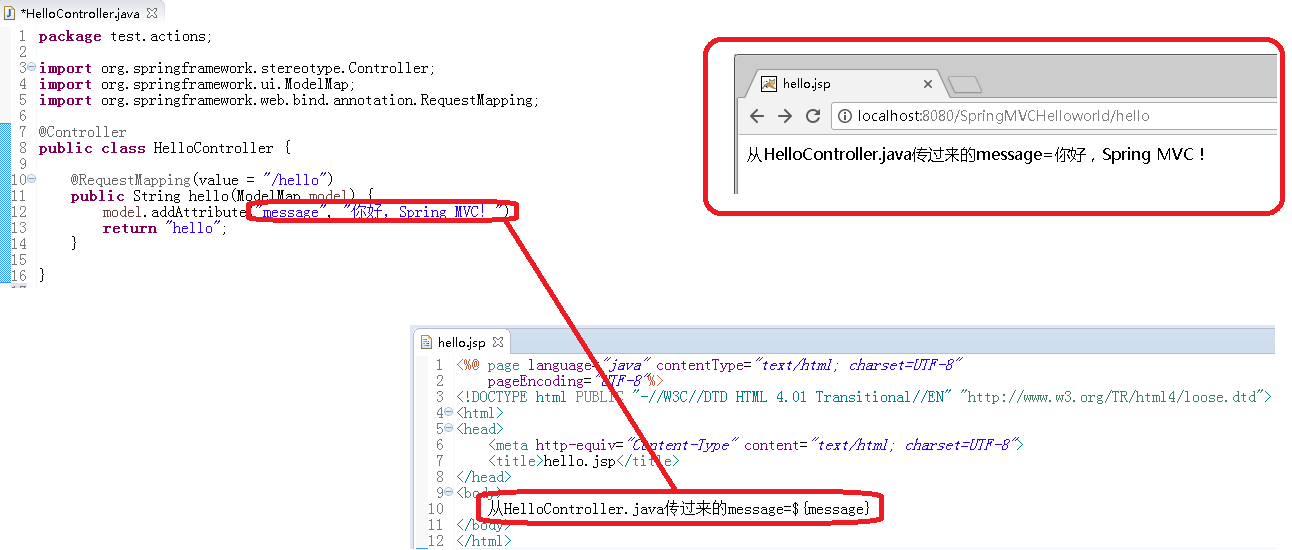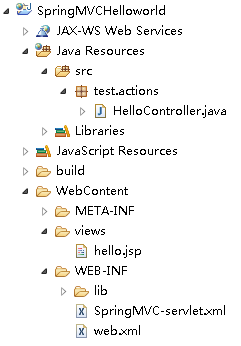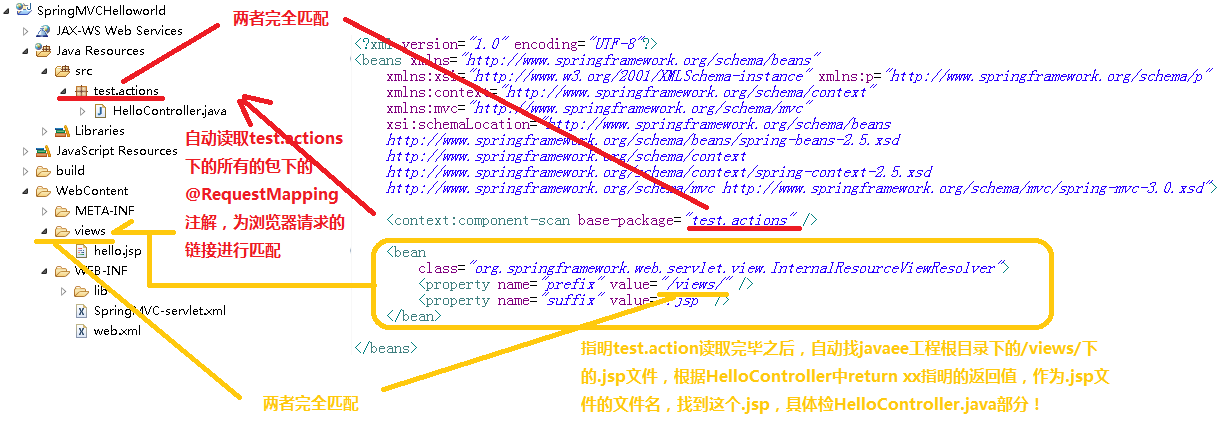SpringMVC就不同于Spring是处理java和xml的数据传输了,SpringMVC是处理views和controllers之间,网页和actions之间,说白了也就是java文件和jsp之间传输的东西。就是Servlet和Struts2那套,具体可以参考《【Servlet】最简单的Servlet JavaWeb程序》(点击打开链接)和《【Struts2】Struts2纯手工安装、配置以及Helloworld,以最新版struts 2.3.20 GA做例子》(点击打开链接),由于Servlet太原始显得太low,近年来Struts2也频频给没事找事的黑客爆出各种随便爆Struts2工程的漏洞,所以业内貌似有种都使用SpringMVC的趋势。SpringMVC和Spring是没啥绝对关系的,大家不要看Spring就觉得SpringMVC也是和Spring难得要死,其实这玩意入门难度也就和struts2差不多。下面举一个例子可以说明。
一、SpringMVC的下载和配置
其实就是《 【Spring】Spring3.x的下载与配置》(点击打开链接)需要的包,提取同样的包到你的JavaEE工程根目录下的WEB-INF\ib,最终使用的具体如下图所示,和Spring3.x需要的包是一模一样的,因为Spring希望他能够支配整个java工程,从javase到javaee再到android,反正有一个java一个xml的地方就有它。
二、工程目的和目录结构
下面的例子希望将HelloController.java设置的message打印到hello.jsp上面来。
工程的目录结构如下:
三、制作过程
1、首先是所有Javaee工程,WEB-INF下的核心web.xml
<?xml version="1.0" encoding="UTF-8"?>
<web-app xmlns:xsi="http://www.w3.org/2001/XMLSchema-instance"
xmlns="http://java.sun.com/xml/ns/javaee"
xsi:schemaLocation="http://java.sun.com/xml/ns/javaee http://java.sun.com/xml/ns/javaee/web-app_3_0.xsd"
version="3.0">
<servlet>
<servlet-name>SpringMVC</servlet-name>
<servlet-class>org.springframework.web.servlet.DispatcherServlet</servlet-class>
</servlet>
<servlet-mapping>
<servlet-name>SpringMVC</servlet-name>
<url-pattern>/</url-pattern>
</servlet-mapping>
</web-app>核心配置文件,加载SpringMVC的同时指明这个加载SpringMVC的servlet的配置文件是XX-servlet.xml,具体如下。SpringMVC规定,所有Servlet配置文件都必须xx-serlvet.xml这样格式命名,如此web.xml配置完毕,SpringMVC就会自动为servlet找以其名字命名的xx-serlvet.xml进一步读取配置。
2、之后是SpringMVC-servlet.xml:
<?xml version="1.0" encoding="UTF-8"?>
<beans xmlns="http://www.springframework.org/schema/beans"
xmlns:xsi="http://www.w3.org/2001/XMLSchema-instance" xmlns:p="http://www.springframework.org/schema/p"
xmlns:context="http://www.springframework.org/schema/context"
xmlns:mvc="http://www.springframework.org/schema/mvc"
xsi:schemaLocation="http://www.springframework.org/schema/beans
http://www.springframework.org/schema/beans/spring-beans-2.5.xsd
http://www.springframework.org/schema/context
http://www.springframework.org/schema/context/spring-context-2.5.xsd
http://www.springframework.org/schema/mvc http://www.springframework.org/schema/mvc/spring-mvc-3.0.xsd">
<context:component-scan base-package="test.actions" />
<bean
class="org.springframework.web.servlet.view.InternalResourceViewResolver">
<property name="prefix" value="/views/" />
<property name="suffix" value=".jsp" />
</bean>
</beans>
这个文件完全指明了.java文件和.jsp之间个关系,具体如下图所示:
3、接下来马上来看test.action下的HelloController.java,配合上面的SpringMVC-servlet.xml和注释,相信大家已经非常清晰了,无须多加赘述了。
package test.actions;
import org.springframework.stereotype.Controller;
import org.springframework.ui.ModelMap;
import org.springframework.web.bind.annotation.RequestMapping;
@Controller
public class HelloController {
@RequestMapping(value = "/hello")//指明我这个方法是相应/hello这个链接
public String hello(ModelMap model) {//这个方法名倒不是很重要,貌似没什么卵用,习惯上和@RequestMapping指明的相应连接匹配
model.addAttribute("message", "你好,Spring MVC!");//指明hello.jsp的${message}的值是"你好,Spring MVC!"
return "hello";//指明我相应完/hello会去到hello.jsp,将我的东西打印出来,真正做到MVC中的VC分离,习惯性相应的链接和.jsp匹配
}
/* 接下来要扩充,比如要加/a这个跳转,可以这样扩充:
* 再下面接着开新方法
@RequestMapping(value = "/a")
public String a(ModelMap model) {
//a需要的代码
return "a";
}
*/
}4、最后是hello.jsp,基本上是刚学网页都要懂的东西,不加多说了。
<%@ page language="java" contentType="text/html; charset=UTF-8"
pageEncoding="UTF-8"%>
<!DOCTYPE html PUBLIC "-//W3C//DTD HTML 4.01 Transitional//EN" "http://www.w3.org/TR/html4/loose.dtd">
<html>
<head>
<meta http-equiv="Content-Type" content="text/html; charset=UTF-8">
<title>hello.jsp</title>
</head>
<body>
从HelloController.java传过来的message=${message}
</body>
</html>
大家可以看到,这里的SpringMVC在jsp打印变量的方法和《【Servlet】利用Servlet3.0标准与JSTL表达式实现文件上传系统,支持图片上传后显示》( 点击打开链接)中的jstl表达式部分是一模一样,但做SpringMVC就不用自己再配一个jstl.jar和standard.jar,非常方便,应该该部分的内容已经在Spring的jar包中已经存在。
上面就是SpringMVC的一套基本流程。



























 310
310

 被折叠的 条评论
为什么被折叠?
被折叠的 条评论
为什么被折叠?








